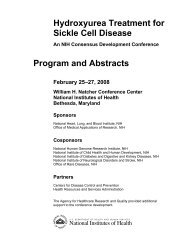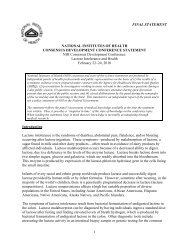Neurological/Psychological Presentation of <strong>Celiac</strong> <strong>Disease</strong>:Ataxia, Depression, Neuropathy, Seizures, and AutismKhalafalla O. Bushara, M.D.<strong>Celiac</strong> disease (CD) has long been associated with a wide spectrum of neurological andpsychiatric disorders including cerebellar ataxia, peripheral neuropathy, myositis, epilepsy,dementia, psychosis, and depression. (1–4) Earlier reports have mainly documented the involvementof the nervous system as a complication of prediagnosed CD. However, more recent studiesemphasized that neurological syndromes may be the presenting extra-intestinal manifestation ofgluten sensitivity with or without intestinal pathology. (5,6) These include migraine,encephalopathy, chorea, brain stem dysfunction, myelopathy, mononeuritis multiplex, GuillianBarre-like syndrome, and neuropathy with positive antiganglioside antibodies. (7–10) It has furtherbeen suggested that gluten sensitivity (as evidenced by high antigliadin antibodies) is a commoncause of neurological syndromes (notably cerebellar ataxia) of otherwise unknown etiology. (11)However, further studies showed high prevalence of gluten sensitivity in geneticneurodegenerative disorders such as hereditary spinocerebellar ataxia and Huntington’sdisease. (12,13) It remains unclear whether gluten sensitivity contributes to the pathogenesis of thesedisorders or whether it represents an epiphenomenon.The mechanisms of nervous system pathology in association with gluten sensitivity iscurrently unclear. Nervous system involvement is unlikely to be due to malabsorption-relateddeficiencies. (14) Although few studies suggested immunological mechanisms, most studiesshowed no evidence for a direct immune-mediated insult to the nervous system. (1,11,15)Studies of gluten-free diet in patients with gluten sensitivity and neurological syndromesshowed variable results. In few patients, gluten-free diet was reported to result in improvementof neurological deficits while in the majority of patients reported, gluten-free diet had nosignificant effect. (1,11) Gluten-free diet trials have also been inconclusive in autism andschizophrenia; two diseases in which sensitivity to dietary gluten has been implicated.Further studies are clearly needed to assess the efficacy of gluten-free diet and to addressthe underlying mechanisms of nervous system pathology in gluten sensitivity.References1. Cooke W, Smith W. Neurological disorders associated with adult coeliac disease. Brain.1966; 89(4):683–722.2. Collin P, Pirttila T, Nurmikko T, Somer H, Erila T, Keyrilainen O. <strong>Celiac</strong> disease, brainatrophy, and dementia. Neurology. 1991;41(3):372–375.3. Finelli PF, McEntee WJ, Ambler M, Kestenbaum D. Adult celiac disease presenting ascerebellar syndrome. Neurology. 1980;30(3):245–249.77
4. Henriksson KG, Hallert C, Walan A. Letter: Gluten-sensitive polymyositis and enteropathy.Lancet. 1976;2(7980):317.5. Hermaszewski RA, Rigby S, Dalgleish AG. Coeliac disease presenting with cerebellardegeneration. Postgrad Med J. 1991;67(793):1023–1024.6. Luostarinen L, Pirttila T, Collin P. Coeliac disease presenting with neurological disorders.Eur Neurol. 1999;42(3):132–135.7. Wills AJ, Turner B, Lock RJ, Johnston SL, Unsworth DJ, Fry L. Dermatitis herpetiformisand neurological dysfunction. J Neurol Neurosurg Psychiatry. 2002;72(2):259–261.8. Hadjivassiliou M, Chattopadhyay AK, Davies-Jones GA, Gibson A, Grunewald RA, LoboAJ. Neuromuscular disorder as a presenting feature of coeliac disease. J Neurol NeurosurgPsychiatry. 1997;63(6):770–775.9. Gabrielli M, Cremonini F, Fiore G, et al. Association between migraine and <strong>Celiac</strong> disease:results from a preliminary case-control and therapeutic study. Am J Gastroenterol.2003;98(3):625–629.10. Shill HA, Alaedini A, Bushara K, Latov N, Hallett M. Anti-ganglioside antibodies inidiopathic and hereditary cerebellar degeneration. Neurology. 2003;60(10):1672–1673.11. Hadjivassiliou M, Grunewald RA, Chattopadhyay AK, et al. Clinical, radiological,neurophysiological, and neuropathological characteristics of gluten ataxia. Lancet.1998;352(9140):1582–1585.12. Bushara KO, Nance M, Gomez CM. Antigliadin antibodies in Huntington’s disease.Neurology. 2004;62(1):132–133.13. Bushara KO, Goebel SU, Shill H, Goldfarb LG, Hallett M. Gluten sensitivity in sporadic andhereditary cerebellar ataxia. Ann Neurol. 2001;49(4):540–543.14. Ward ME, Murphy JT, Greenberg GR. <strong>Celiac</strong> disease and spinocerebellar degeneration withnormal vitamin E status. Neurology. 1985;35(8):1199–1201.15. Dick DJ, Abraham D, Falkous G, Hishon S. Cerebellar ataxia in coeliac disease—noevidence of a humoral aetiology. Postgrad Med J. 1995;71(833):186.78
- Page 1 and 2:
NIH Consensus Development Conferenc
- Page 3 and 4:
III. What Are the Manifestations an
- Page 5 and 6:
• What is the management of celia
- Page 7 and 8:
Monday, June 28, 2004 (continued)I.
- Page 9 and 10:
Monday, June 28, 2004 (continued)II
- Page 11 and 12:
Wednesday, June 30, 2004 (continued
- Page 13 and 14:
Lisa H. RichardsonConsumer Represen
- Page 15 and 16:
Ciaran P. Kelly, M.D.Director, Celi
- Page 17 and 18: Van S. Hubbard, M.D., Ph.D.Director
- Page 19 and 20: AbstractsThe following are abstract
- Page 21 and 22: susceptibility (e.g., DR17 homozygo
- Page 23 and 24: The Pathology of Celiac DiseaseDavi
- Page 25 and 26: In this regard, the transport pathw
- Page 27 and 28: for the IgG-based test, while speci
- Page 29 and 30: 15. de Lecea A, Ribes-Koninckx C, P
- Page 31 and 32: Clinical Algorithm in Celiac Diseas
- Page 33 and 34: Considera diagnosisof celiac diseas
- Page 35 and 36: There are populations at particular
- Page 37 and 38: Serological Testing for Celiac Dise
- Page 39 and 40: Estimates of the sensitivity of the
- Page 41 and 42: the risk and severity of CD may als
- Page 43 and 44: What Are the Prevalence and Inciden
- Page 45 and 46: ascribed to excess menstrual loss.
- Page 47 and 48: ReferencesFamily History of Celiac
- Page 49 and 50: Carroccio A, Iannitto E, Cavataio F
- Page 51 and 52: identified by surveys or through so
- Page 53 and 54: Clinical Presentation of Celiac Dis
- Page 55 and 56: een widely reported. The question r
- Page 57 and 58: The Many Faces of Celiac Disease: C
- Page 59 and 60: References1. Green PH, Jabri B. Coe
- Page 61 and 62: Association of Celiac Disease and G
- Page 63 and 64: Does the Gluten-Free Diet Protect F
- Page 65 and 66: Skin Manifestations of Celiac Disea
- Page 67: allow a better understanding of the
- Page 71 and 72: characterized, clinically-identifie
- Page 73 and 74: 10. Hoffenberg EJ, Emery LM, Barrig
- Page 75 and 76: ataxia, epilepsy with posterior cer
- Page 77 and 78: Consequences of Testing for Celiac
- Page 79 and 80: Osteoporosis/FracturesThere were 11
- Page 81 and 82: Dietary Guidelines for Celiac Disea
- Page 85 and 86: 21. Thompson T. Thiamin, riboflavin
- Page 88 and 89: In order to effectively counsel ind
- Page 90 and 91: 9. Hallert C, Granno C, Hulten S, M
- Page 92 and 93: adhered to the GFD after more than
- Page 94 and 95: Patient education, close supervisio
- Page 96: 26. Mustalahti K, Lohiniemi S, Laip







